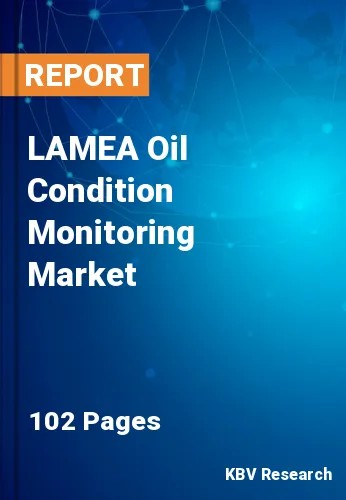The Latin America, Middle East and Africa Oil Condition Monitoring Market would witness market growth of 10.9% CAGR during the forecast period (2023-2029).
Oil condition monitoring is one of the vehicle industry's most heavily researched and developed fields. In order to identify the degree of engine lubricant deterioration and lower unnecessary maintenance costs and power loss, engine oil condition monitoring systems have developed quickly. It is necessary to ascertain oil quality on demand and give supplementary information on oil conditions. There are various financial, environmental, and logistical incentives to enhance and greatly increase the reliability of the lubricant monitoring system.
Online real-time engine oil viscosity monitoring offers several financial, environmental, and logistical incentives. These give numerous economic, logistical, faster response times, accurate information, reduced failures & better operations, and environmental benefits. The main benefit of real-time data tracking is that it opens a window into the intermittent stresses that are placed on a lubrication system when a machine goes through different operating as well as duty cycles. In addition, using real-time viscosity monitoring systems allows for quantifying changes in the lubricant's physical characteristics and a more precise assessment of the oil's state, lowering oil consumption and making it possible to identify the component failure.
The government-led investments in the rail, sea, road, airport, and logistics infrastructure significantly impact the size and strength of the logistics and transportation sector. Saudi Arabia is spending money to expand its transportation networks due to several causes, including economic growth, population aging, and growing urbanization. Collaborating closely with top-tier international logistics businesses through public-private partnerships (PPP) involves the deployment of urban transport systems like metros and buses as well as inter-urban networks like freight and high-speed railways.
Similarly, as long as the Colombian government prioritizes the oil & gas industry as a major source of revenue for the central government, the demand for oil & gas equipment as well as services in Colombia will continue to be a significant potential for numerous businesses. As a result, the demand for oil condition monitoring will increase in the region, augmenting the expansion of the market.
The Brazil market dominated the LAMEA Oil Condition Monitoring Market by Country in 2022; thereby, achieving a market value of $24.2 million by 2029. The Argentina market is experiencing a CAGR of 11.5% during (2023 - 2029). Additionally, The UAE market would exhibit a CAGR of 10.6% during (2023 - 2029).
Based on Product Type, the market is segmented into Engine, Gear Systems, Turbine, Hydraulic Systems and Compressor. Based on Sampling Type, the market is segmented into Off-site Sampling and On-site Sampling. Based on End User, the market is segmented into Oil & Gas, Industrial, Power Generation, Transportation and Mining. Based on countries, the market is segmented into Brazil, Argentina, UAE, Saudi Arabia, South Africa, Nigeria, and Rest of LAMEA.
Free Valuable Insights: The Worldwide Oil Condition Monitoring Market is Projected to reach USD 1.2 Billion by 2029, at a CAGR of 7.7%
The market research report covers the analysis of key stake holders of the market. Key companies profiled in the report include Parker Hannifin Corporation, General Electric Company, Bureau Veritas S.A., Intertek Group PLC, SGS S.A., Eaton Corporation PLC, BP p.l.c., TotalEnergies SE, Shell plc, Chevron Corporation.
By Product Type
By Sampling Type
By End User
By Country
Our team of dedicated experts can provide you with attractive expansion opportunities for your business.

